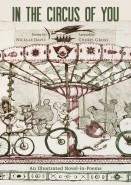
Book Review: In the Circus of You by Nicelle Davis and Cheryl Gross

In the Circus of You
Poems Nicelle Davis and Illustrations by Cheryl Gross
Rose Metal Press, March 2015
ISBN-13: 978-1941628003
$14.95; 94 pp.
Reviewed by Renée K. Nicholson
With In the Circus of You, an illustrated novel-in-poems, Rose Metal Press continues a tradition of publishing work outside the literary mainstream. To say this book is a hybrid doesn’t quite capture all that it accomplishes, as In the Circus of You combines hybrid form with collaboration. Nicelle Davis’s poems follow a rough narrative arc, emotionally driven rather than plot-pushed. Verse is in conversation with Cheryl Gross’s drawings, renderings that connect with specific poems but invite multiple interpretations, placing the reader in a co-creative mode in the space between linguistic text and the pictorial one. While the relationship between text and picture isn’t specifically defined, the openness invites one to contemplate associations, focusing on accumulation rather than decision. Much like a dream, language and illustration create a circular gesture, almost as the way conscious and subconscious are connected but not always explained. In the poem, “A Secret Note from the Dream-Self,” Davis perhaps nods to how the drawings work:
Pictures occupy both living
and dead spaces—dreams
are made from such over-
laps…
However, at this point in the trajectory of the poems, the dream-self, or the subconscious self has yet to fully actualize.
Such is the emotional journey of Davis’s poems, propelling us through the dissolution of a relationship and marriage and the reclaiming of an authentic self. The idea of the circus allows Davis latitude to present the beautiful with the grotesque, gesturing to the circus in both concrete and oblique ways. A section of the book is titled The Clown Act, and specifically calls upon the terror clowns often instill in people to recreate emotional states, as in the begging of “The Clown in My Gut”:
tips his hat and hands me an inflated
snake—twisted to the shape
of a rose.
Later in the same poem, the clown returns:
…You
win, Clown hisses
into my liver
where
my
younger-self crouches over her face—
Gross’s drawing mirrors this language, evoking the innocence of the child-self confronting the overblown clown, which appears both cartoonish and scary.
In an earlier part of the book, in the prose poem “Dear Sir,” Davis writes, “There are pills: Ritalin. Dexedrine. Cylert. My husband is relieved.” The poem describes the experience of taking medication as being a caged pigeon, which Gross then portrays as a bird in a cage in her accompanying drawing. But by the end of the Clown section the pills themselves undergo significant change. In “Clowns Promise What Can’t Be Delivered” Davis asserts, “You said that these clowns were the solution to our/marital problems…” and ends with the line, “I am done swallowing clowns.” Unlike in “Dear Sir,” there is not an accompanying drawing, and the pills lose their stranglehold, having gone from that which eclipses flight to being an overblown entertainer in garish makeup. In parenthesis, Davis affirms, “I miss myself more than I’ll ever miss us” an emotional climax that leads out of the circus.
The poems reach towards acceptance of both what has been and what is yet to be. Davis arcs towards rebirth in the final poem, “Reborn Inside-Out, My Life is Explained to Me/by My Six-Year-Old Son” in which her son explains that through regeneration we learn to find joy. Davis leads us from this idea of searching for joy by ending on a one sentence stanza, “Our story will happen again.”
A former ballet dancer whose career was cut short by the onset of rheumatoid arthritis, and author of the poetry collection Roundabout Directions to Lincoln Center (Urban Farmhouse Press 2014), Renée K. Nicholson is an assistant professor in the Multidisciplinary Studies Program at West Virginia University and was the 2011 Emerging Writer-in-Residence at Penn State-Altoona. Her writing has appeared in Poets & Writers, Midwestern Gothic, Moon City Review, The Superstition Review, The Gettysburg Review and elsewhere. Her website is www.reneenicholson.com.
